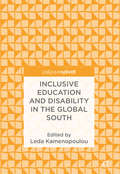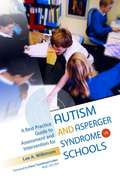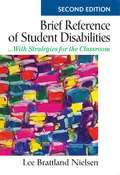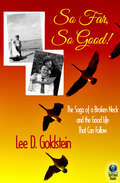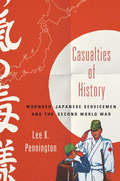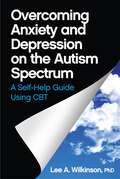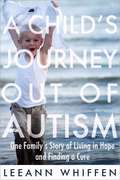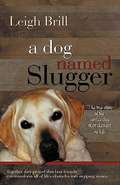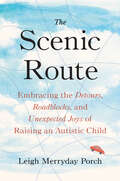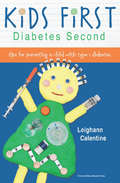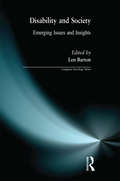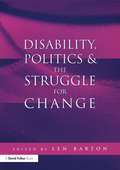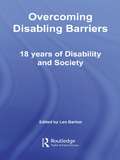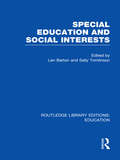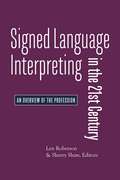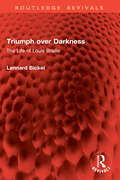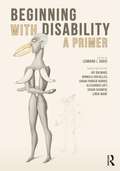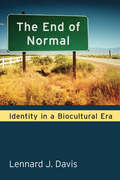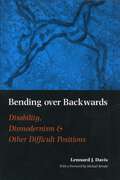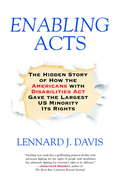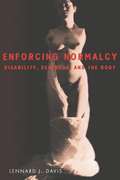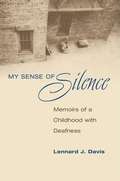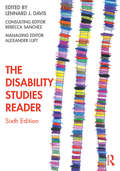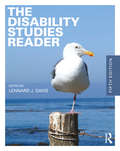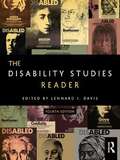- Table View
- List View
Inclusive Education and Disability in the Global South
by Leda KamenopoulouThis edited volume examines inclusive education and disability in the global South. Presenting four qualitative research studies conducted in Malaysia, Bhutan, Philippines and Belize, the authors examine the implementation of inclusive education and disabled children’s participation in the education system: contexts on which very little is known. Thus, this book provides a unique opportunity to access rare context-specific information concerning this region of the world; and to reflect on the particular challenges some countries face in the realization of full participation of all children within education. Authored by researchers who are also teaching professionals with experience and understanding of the complexities of the real world, this book reminds us that researchers and policy makers must listen to all voices and perspectives: especially those that have remained silenced and ignored.
A Best Practice Guide to Assessment and Intervention for Autism and Asperger Syndrome in Schools
by Lee A. Wilkinson*Winner in the Education/Academic category of the 2011 Next Generation Indie Book Awards**Shortlisted for the 2011 NASEN Award 'The Special Needs Academic Book'*With a focus on best practice and the importance of early diagnosis, this book provides a practical and scientifically-based approach to the assessment and diagnosis of Asperger Syndrome and autism spectrum conditions. This book offers a balance of conceptual, practical and empirical information designed to bridge the research-to-practice gap in identifying, assessing, and treating school-aged children with autism-related conditions. Assessment tools and intervention strategies will support school-based professionals in:· identifying and assessing young people with high-functioning autism spectrum conditions· developing and implementing classroom-based intervention programs· initiating a dialogue between parents and teachers· accessing community resources· promoting special needs advocacy. With illustrative case studies, FAQs, quick reference boxes, and a glossary, this accessible guide will appeal to teachers, counsellors, psychologists, social work practitioners and students.
Brief Reference of Student Disabilities: ...With Strategies for the Classroom
by Lee Brattland NielsenThis updated edition provides information about common exceptionalities, ADHD and bipolar disorder, legal considerations, and discussions on postsecondary transition, NCLB, and the reauthorization of IDEA 2004.
So Far, So Good!: The Saga of a Broken Neck, and the Good Life that Can Follow
by Lee D. GoldsteinThe candid and inspiring memoir of one man&’s rewarding life spent in a chair—a story of family, spinal injury, and choosing happiness. Lee Goldstein was fourteen years old when an innocent day at the beach ended in a life-altering accident. Yet even in the midst of that fateful tragedy, Lee finds reasons to be grateful—after all, he was rescued from drowning by a famous singer and hobnobbed with celebrities in the hospital. Lee would spend the rest of his life as a quadriplegic, but thanks to the support of his loving family and his own unflagging determination, he lives a long and beautiful life. Lee and his wife Marilyn raise five adopted children, including Tim, who faces his own challenges when he is diagnosed with autism. Though he later loses Marilyn, Lee goes on to fall in love with and marry Ellen, who makes his later years close to divine. Lee always focuses on the positive, but he pulls no punches in his frank and honest account of what quadriplegics and their caretakers deal with every day, from the use of wheelchairs, to bathroom needs, to the sometimes life-threatening, embarrassing, or hilarious moments of life.
Casualties of History: Wounded Japanese Servicemen and the Second World War (Studies of the Weatherhead East Asian Institute, Columbia University)
by Lee K. PenningtonThousands of wounded servicemen returned to Japan following the escalation of Japanese military aggression in China in July 1937. Tens of thousands would return home after Japan widened its war effort in 1939. In Casualties of History, Lee K. Pennington relates for the first time in English the experiences of Japanese wounded soldiers and disabled veterans of Japan's "long" Second World War (from 1937 to 1945). He maps the terrain of Japanese military medicine and social welfare practices and establishes the similarities and differences that existed between Japanese and Western physical, occupational, and spiritual rehabilitation programs for war-wounded servicemen, notably amputees. To exemplify the experience of these wounded soldiers, Pennington draws on the memoir of a Japanese soldier who describes in gripping detail his medical evacuation from a casualty clearing station on the front lines and his medical convalescence at a military hospital. Moving from the hospital to the home front, Pennington documents the prominent roles adopted by disabled veterans in mobilization campaigns designed to rally popular support for the war effort. Following Japan’s defeat in August 1945, U.S. Occupation forces dismantled the social welfare services designed specifically for disabled military personnel, which brought profound consequences for veterans and their dependents. Using a wide array of written and visual historical sources, Pennington tells a tale that until now has been neglected by English-language scholarship on Japanese society. He gives us a uniquely Japanese version of the all-too-familiar story of soldiers who return home to find their lives (and bodies) remade by combat.
Overcoming Anxiety and Depression on the Autism Spectrum: A Self-Help Guide Using CBT
by Lee WilkinsonCognitive Behavioral Therapy (CBT) has been shown to be effective for treating mental health problems such as anxiety and depression in individuals both with and without autism spectrum disorders. This book bridges the gap between research and practice and shows adults on the spectrum practical ways to manage their emotions. Many adults on the autism spectrum experience isolation, interpersonal difficulties, anxiety, depressed mood, and coping problems. By applying theory and concepts from autism research, this book will help adults on the spectrum to understand their challenges. The author takes the best of CBT self-help strategies, to encourage self-analysis, and to help adults on the spectrum make better decisions in activities such as employment or relationships. This is an essential self-help guide for adults on the spectrum looking for ways to cope with emotional challenges, and will also be a useful resource for clinicians, psychologists, therapists, and counselors working with them.
A Child’s Journey Out of Autism
by Leeann WhiffenThe therapy costs $30,000. We'd be mortgaging our lives and our savings on something we're not even sure could help our son. But the clock is ticking: the longer we wait, the harder it will be to pull him out of this shell. How are we going to afford it? How can we not afford it? When Clay Whiffen was diagnosed on the autism spectrum, his parents didn't know where to turn. They refused to believe that he could not be cured, and began to try every therapy they could afford - and many they couldn't. In this extraordinary story of one family's struggle with autism, Leeann Whiffen gives voice to the fear of losing a child and the fight to reclaim him, exploring what treatments eased her son Clay's symptoms, where the Whiffens found support, and how the family conquered one of the toughest challenges a child can face. With a foreword by autism specialist Dr. Bryan Jepson, A Child's Journey out of Autism spells out what treatments worked, where the family found help, and how they made it through this crushing crisis. In a time of despair and confusion - when another child is diagnosed with autism every 20 minutes - this is a profound, proven message of hope for anyone whose life is touched by the disorder.
A Dog Named Slugger: The True Story of the Friend Who Changed My World
by Leigh BrillThe true life story of a dog who changed everything for one woman. For the first time in my life, I didn't need to pretend, I didn't need to be tough: I only needed to be honest. "I have cerebral palsy. I walk funny and my balance is bad. I fall a lot. My hands shake, too. That means I'm not so good at carrying things. And if I drop stuff, sometimes it's hard to just bend down and get it." I waited anxiously for the interviewer's response. She smiled. "It sounds like a service dog could be great for you." So began Leigh Brill's journey toward independence and confidence, all thanks to a trained companion dog named Slugger. The struggling college student and the Labrador with a "a coat like sunshine" and a tail that never stopped wagging became an instant team. Together, they transformed a challenge into a triumph. Together, they inspired and educated everyone they met. Now, Leigh honors her friend with the story of their life, together.
The Scenic Route: Embracing the Detours, Roadblocks, and Unexpected Joys of Raising an Autistic Child
by Leigh Merryday PorchReflections on autism, parenting, and embracing destinations unknown.In The Scenic Route, Leigh Merryday Porch offers insight into how parents of children with autism can redefine hope in a world that often has a narrow view of what hope is supposed to look like for their kids. As an educator and expert on autism spectrum disorders as well as the mother of a son who is autistic, Porch knows well the pressure parents of special needs children feel to overcome any and all challenges their children face. But not all disabilities result in heartwarming viral stories. According to Porch, we must write our own stories about what is possible for our kids and love them just as they are. A chronicle of one family&’s journey from the shock and uncertainty of a severe autism diagnosis to acceptance and advocacy, in this beautifully written book Porch shares the lessons she has learned about charting your own course. From learning to cope with sleepless, worry-filled nights to asking friends and family for the help and support you actually need, she offers readers a road map for helping our children thrive while still taking the time to stop and enjoy the beauty in life&’s unforeseen detours.
Kids First Diabetes Second: Tips for Parenting a Child with Type 1 Diabetes
by Leighann Calentine Robin Porter<P> Raising a child is a difficult job. Raising a child with a chronic illness such as diabetes can be a difficult job with a side order of special challenges. <P> Leighann Calentine's D-Mom Blog is an invaluable resource for parents and caregivers of children with diabetes. Leighann shares her family's experiences with her daughter's type 1 diabetes in a forum that is intimate, informative, and inspirational. <P> In a style both practical and affirming, Kids First, Diabetes Second presents Leighann's advice to help parents and caregivers enable children with diabetes to thrive. Learn how to automate tasks, navigate challenges, celebrate achievements, establish a support group, relieve stress, and avoid being consumed by management of the condition, while focusing on what's most important: raising a happy, healthy child. <P> <b> 2013 ERIC HOFFER BOOK AWARD WINNER </b>
Disability and Society: Emerging Issues and Insights (Longman Sociology Series)
by Len BartonThe study of disability has traditionally been influenced mainly by medical and psychological models. The aim of this new text, Disability and Society, is to open up the debate by introducing alternative perspectives reflecting the increasing sociological interest in this important topic.Disability and Society brings together for the first time some of the most recent original research in this rapidly expanding area. The contributors, both disabled and non-disabled, are all leading thinkers in their field and suggest new ways of understanding disability, developing policy and challenging current practice.
Disability, Politics and the Struggle for Change
by Len BartonThis book seeks to explore how disability is understood and the position and experiences of disabled people both within and across different societies. The authors explore the question of politics in relation to specific struggles, providing a wealth of insights and ideas, and examine the nature and value of a social model of disability. They criticize exclusionary barriers while advancing a more democratic and participatory society based on principles of equality, offer cross-cultural insights and present stimuli for debate and further research. The text is accessible, topical, and provides new and innovatory thinking. This book will appeal to undergraduate and postgraduate students, lecturers and researchers with interests in education, social policy, sociology and disability studies.
Overcoming Disabling Barriers: 18 Years of Disability and Society (Education Heritage)
by Len BartonThis book provides a valuable route map to the development of thinking in disability studies over the last eighteen years. It includes over twenty essential articles from the journal Disability and Society, written by many of the leading authors in the field from the UK, the USA, Australia and Europe. Compiled by the current editors of the journal, it is divided into three sections which mirror the three central themes: disability studies – clearly illustrates the debates and challenges that have emerged within the field over the last two decades policy – offers a snapshot of social policy that has impinged on the lives of disabled people in many parts of the world research issues – reveals the inequalities between disabled and non-disabled people and the advocacy of new methods and research practices. The editors’ specially written introduction to each section contextualises the selection and introduces students to the main issues and current thinking in the field. Altogether this book is a rich source of ideas and insights covering conceptual, theoretical, empirical and cross-cultural issues and questions.
Special Education and Social Interests (Routledge Library Editions: Education)
by Len Barton Sally TomlinsonUntil this book was published, most writing on special education was about specific disabilities and how to cope with them. This book, however, considers the broader context, looking at many problems for the wider system that have arisen through integration of special education within it. The book is international and comparative in its focus and includes much North American material and work by North American researchers.
Signed Language Interpreting in the 21st Century: An Overview of the Profession
by Len Roberson Sherry ShawThis text provides interpreting students with a broad knowledge base that encompasses the latest research, addresses current trends and perspectives of the Deaf community, and promotes critical thinking and open dialogue about the working conditions, ethics, boundaries, and competencies needed by a highly qualified interpreter in various settings. This volume expands the resources available to aspiring interpreters, including Deaf interpreters, and incorporates the voices of renowned experts on topics relevant to today’s practitioners. Each chapter provides students with objectives, keywords, and discussion questions. The chapters convey clear information about topics that include credentialing, disposition and aptitude for becoming an interpreter, interpreting for people who are DeafBlind, and working within specialty settings, such as legal and healthcare. A key resource for interpreter certification test preparation, this text follows the interpreter’s ethical, practical, and professional development through a career of lifelong learning and service.
Triumph over Darkness: The Life of Louis Braille (Routledge Revivals)
by Lennard BickelFirst published in 1988, Triumph over Darkness is a stirring story of determination and tenacity in the face of adversity. Born in France in 1809, Louis Braille was the 4th child of a village saddler. At the age of three he stabbed himself in the eye with a pointed tool taken from his father’s work bench. Some 13 years later he again took a sharp tool from the same bench and used it to create a code of raised dots punched through sheets of paper. With the patience of genius, he perfected his code- still unsurpassed-and fashioned an alphabet that opened the world of learning to the blind.Louis Braille died at the age of 43 unknown and unhonoured. He superiors at the Royal Institute for the Young Blind in Paris would not recognise the system that was not based on the shapes of the alphabet. Lennard Bickel researched this story in Paris and in the small village where Louis Braille was born. He tells of the trials and torments of a young blind man struggling amid the harshest conditions to perfect something he believed in. This book will be of interest to general readers interested in the life of Louis Braille.
Beginning With Disability: A Primer
by Lennard DavisWhile there are many introductions to disability and disability studies, most presume an advanced academic knowledge of a range of subjects. In Beginning with Disability, Lennard Davis has put together the first introductory reader for disability studies aimed at first- and second-year students in two- and four-year colleges. This volume of essays across disciplines including education, sociology, communications, psychology, social sciences, and humanities features accessible, readable, and relatively short articles that do not require specialized knowledge. Lennard Davis, along with a team of consulting editors, has put together feature a number of blogs, vlogs, and other videos to make the materials more direct and vivid to students. The text includes a section called "Subject to Debate" that features short pro and con pieces on controversial subjects that can be debated in class or act as prompts for assignments.
The End of Normal: Identity in a Biocultural Era
by Lennard DavisIn an era when human lives are increasingly measured and weighed in relation to the medical and scientific, notions of what is "normal" have changed drastically. While it is no longer useful to think of a person's particular race, gender, sexual orientation, or choice as "normal," the concept continues to haunt us in other ways. In The End of Normal, Lennard J. Davis explores changing perceptions of body and mind in social, cultural, and political life as the twenty-first century unfolds. The book's provocative essays mine the worlds of advertising, film, literature, and the visual arts as they consider issues of disability, depression, physician-assisted suicide, medical diagnosis, transgender, and other identities. Using contemporary discussions of biopower and biopolitics, Davis focuses on social and cultural production--particularly on issues around the different body and mind. The End of Normal seeks an analysis that works comfortably in the intersection between science, medicine, technology, and culture, and will appeal to those interested in cultural studies, bodily practices, disability, science and medical studies, feminist materialism, psychiatry, and psychology.
Bending Over Backwards: Essays on Disability and the Body (Cultural Front #6)
by Lennard J. DavisWith the advent of the human genome, cloning, stem-cell research and many other developments in the way we think of the body, disability studies provides an entirely new way of thinking about the body in its relation to politics, the environment, the legal system, and global economies. Bending Over Backwards reexamines issues concerning the relationship between disability and normality in the light of postmodern theory and political activism. Davis takes up homosexuality, the Americans with Disabilities Act, the legal system, the history of science and medicine, eugenics, and genetics. Throughout, he maintains that disability is the prime category of postmodernity because it redefines the body in relation to concepts of normalcy, which underlie the very foundations of democracy and humanistic ideas about the body. Bending Over Backwards argues that disability can become the new prism through which postmodernity examines and defines itself, supplanting the categories of race, class, gender, and sexual orientation.
Enabling Acts
by Lennard J. Davis<P>The first significant book on the history and impact of the ADA--the "eyes on the prize" moment for disability rights. <P>The Americans with Disabilities Act (ADA) is the widest-ranging and most comprehensive piece of civil rights legislation ever passed in the United States, and it has become the model for disability-based laws around the world. Yet the surprising story behind how the bill came to be is little known. <P>In this riveting account, acclaimed disability scholar Lennard J. Davis delivers the first behind-the-scenes and on-the-ground narrative of how a band of leftist Berkeley hippies managed to make an alliance with upper-crust, conservative Republicans to bring about a truly bipartisan bill. <P>Based on extensive interviews with all the major players involved including legislators and activists, Davis recreates the dramatic tension of a story that is anything but a dry account of bills and speeches. Rather, it's filled with one indefatigable character after another, culminating in explosive moments when the hidden army of the disability community stages scenes like the iconic "Capitol Crawl" or an event some describe as "deaf Selma," when students stormed Gallaudet University demanding a "Deaf President Now!" <P>From inside the offices of newly formed disability groups to secret breakfast meetings surreptitiously held outside the White House grounds, here we meet countless unsung characters, including political heavyweights and disability advocates on the front lines. "You want to fight?" an angered Ted Kennedy would shout in an upstairs room at the Capitol while negotiating the final details of the ADA. Congressman Tony Coelho, whose parents once thought him to be possessed by the devil because of his epilepsy, later became the bill's primary sponsor. There's Justin Dart, adorned in disability power buttons and his signature cowboy hat, who took to the road canvassing fifty states, and people like Patrisha Wright, also known as "The General," Arlene Myerson or "the brains," "architect" Bob Funk, and visionary Mary Lou Breslin, who left the hippie highlands of the West to pursue equal rights in the marble halls of DC. <P>Published for the twenty-fifth anniversary of the ADA, Enabling Acts promises to ignite readers in a discussion of disability rights by documenting this "eyes on the prize" moment for tens of millions of American citizens.
Enforcing Normalcy: Disability, Deafness, and the Body
by Lennard J. DavisThis book tries to think through some of the complex issues raised by concepts such as the body, the normal, the abnormal, disability, the disabled, and people with disabilities. I wrote this book because I believe deeply that people with disabilities, Deaf people, and others who might not even consider themselves as having a disability have been relegated to the margins by the very people who have celebrated and championed the emergence of multiculturalism, class consciousness, feminism, and queer studies from the margins.
My Sense of Silence: Memoirs of a Childhood with Deafness
by Lennard J. DavisLennard J. Davis grew up as the hearing child of deaf parents. In this candid, affecting, and often funny memoir, he recalls the joys and confusions of this special world, especially his complex and sometimes difficult relationships with his working-class Jewish immigrant parents. Gracefully slipping through memory, regret, longing, and redemption, My Sense of Silence is an eloquent remembrance of human ties and human failings.
The Disability Studies Reader
by Lennard J. DavisDisability studies has gone from being a relatively unknown field to one of increasing importance in the social sciences. The sixth edition of The Disability Studies Reader brings in new topics, scholars, writers, artists, and essays to address links between ableism and imperialism; disability bioethics; and the relationship between disability agency, social policy, and decarceration. There are as many meanings and experiences of disability as there are disabled people, and this diversity ensures that the work of the field will continue to evolve. Fully revised and brought up to date, this volume addresses a wider range of geographical and cultural contexts, and many pay specific attention to the intersections between disability and race, gender, and sexuality. The growing interest and activism around the issue of neuroatypicality is also reflected in a new section on neurodivergence. The Disability Studies Reader remains an excellent touchstone for students in disability studies courses across the disciplines, including the social sciences, English literature, and psychology.
The Disability Studies Reader
by Lennard J. DavisThe fifth edition of The Disability Studies Reader addresses the post-identity theoretical landscape by emphasizing questions of interdependency and independence, the human-animal relationship, and issues around the construction or materiality of gender, the body, and sexuality. Selections explore the underlying biases of medical and scientific experiments and explode the binary of the sound and the diseased mind. The collection addresses physical disabilities, but as always investigates issues around pain, mental disability, and invisible disabilities as well. Featuring a new generation of scholars who are dealing with the most current issues, the fifth edition continues the Reader’s tradition of remaining timely, urgent, and critical.
The Disability Studies Reader, 4th Edition
by Lennard J. DavisThe Fourth Edition of the Disability Studies Reader breaks new ground by emphasizing the global, transgender, homonational, and posthuman conceptions of disability. Including physical disabilities, but exploring issues around pain, mental disability, and invisible disabilities, this edition explores more varieties of bodily and mental experience. New histories of the legal, social, and cultural give a broader picture of disability than ever before. Now available for the first time in eBook format 978-0-203-07788-7.
